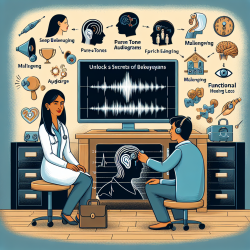Key Findings from the Research
The study analyzed 12 new cases with 16q24.2q24.3 deletions and found that the presence of specific genes, such as ZFPM1, CDH15, and ZNF778, contributes to the severity of the neurological impairment and other clinical features. The research emphasizes the importance of these genes in differentiating between KBG syndrome and 16q24.3 microdeletion syndrome.
Clinical Implications
Understanding these genetic distinctions is critical for speech-language pathologists (SLPs) working with children who have developmental delays or cognitive impairments. Here’s how you can apply these findings:
- Personalized Therapy Plans: Tailor your therapy plans based on the specific genetic makeup of the child. For instance, children with 16q24.3 microdeletion syndrome may require more intensive interventions for neurological impairments compared to those with KBG syndrome.
- Early Identification: Recognize the signs of thrombocytopenia and astigmatism in children with 16q24.3 microdeletion syndrome, which are not typically present in KBG syndrome. Early identification can lead to timely and appropriate interventions.
- Collaboration with Geneticists: Work closely with geneticists to understand the specific deletions and their implications. This collaborative approach can enhance the overall treatment plan and improve outcomes for the child.
Encouraging Further Research
The findings from this study highlight the importance of genetic research in understanding developmental disorders. As practitioners, staying updated with the latest research and incorporating these insights into your practice can significantly impact the lives of the children you work with. Consider conducting or participating in further research to explore the implications of different genetic deletions and their impact on speech and language development.
To read the original research paper, please follow this link: Haploinsufficiency for ANKRD11-flanking genes makes the difference between KBG and 16q24.3 microdeletion syndromes: 12 new cases.










